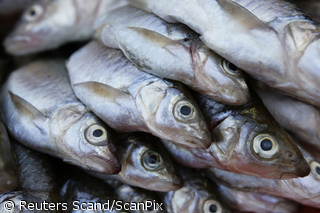Environment ministry unveils options to transform Czech power sector
Published:
31 October 2003 y., Friday
The Ministry of Environment last week unveiled a series of principles and policies that would radically transform the country's energy policy.
The philosophy underlying the 120-page policy document is that a fundamental change in current energy production must occur before the country can meet European Union (EU) demands to curb the greenhouse gases responsible for climate change.
The document is largely a response to the proposed future energy policy drawn up by the Ministry of Industry and Trade before the summer. Its favorite option, that of the country's biggest power company CEZ and, not surprisingly, the coal companies themselves, is for Czech power production to continue to be largely reliant on domestic power sources, notably coal-fired and nuclear plants.
The most serious flaw in that proposal, writes environmental ministry adviser Martin Bursik, the document's main author, is that it doesn't address how to counter the greenhouse gases produced and climate change caused by current Czech energy production and use. Czech membership in the EU and the EU's moves to take the global lead in countering climate change means the Czech Republic will come under increasing pressure to fall into line with this aspect of energy policy in the future, Bursik added.
Current emissions of greenhouse gases per person in the Czech Republic are around 30 percent higher than the EU average due to the heavy use of fossil fuels and inefficient production and use of energy.
Energy and transport together account for 42 percent of Czech emissions of carbon dioxide, the main greenhouse gas.
The Ministry of Industry and Trade also failed to take into account EU efforts to introduce ecological taxes, which would penalize the energy sources most responsible for greenhouse gases, namely brown and hard coal. A directive on ecological taxes is expected to be adopted by the European Commission within a few weeks. It will call for national taxes based on the carbon dioxide producing capacities of various fuels to be introduced by all countries including future members like the Czech Republic, Bursik said.
Such taxes would transform the current economics of the energy market and help to make renewable sources attractive. With the taxes and other incentives, renewable energy could account for 20 percent of Czech energy production by 2030, according to the environment ministry.
Šaltinis:
ceebiz.com
Copying, publishing, announcing any information from the News.lt portal without written permission of News.lt editorial office is prohibited.
The most popular articles
 New legislation for pan-European supervision of credit rating agencies and a public debate on how financial institutions are managed.
more »
New legislation for pan-European supervision of credit rating agencies and a public debate on how financial institutions are managed.
more »
 On 2 June in Vilnius, Lithuania‘s Vice-Minister of Foreign Affairs Asta Skaisgirytė Liauškienė and Deputy Director General of the World Trade Organization Rufus H. Yerxa discussed the main issues on the international trade policy agenda, Russia‘s WTO accession and the changing role of China in the world economy.
more »
On 2 June in Vilnius, Lithuania‘s Vice-Minister of Foreign Affairs Asta Skaisgirytė Liauškienė and Deputy Director General of the World Trade Organization Rufus H. Yerxa discussed the main issues on the international trade policy agenda, Russia‘s WTO accession and the changing role of China in the world economy.
more »
 2157 former construction workers in Spain and 598 ex-employees at the Irish crystal glass company Waterford Crystal with suppliers could get €11 million in EU globalisation adjustment fund aid for training, self-employment and professional orientation under plans approved by the Budgets Committee on Wednesday.
more »
2157 former construction workers in Spain and 598 ex-employees at the Irish crystal glass company Waterford Crystal with suppliers could get €11 million in EU globalisation adjustment fund aid for training, self-employment and professional orientation under plans approved by the Budgets Committee on Wednesday.
more »
 Companies from the UK, Belgium, Germany and Spain have won the 2010 European Business Awards for the Environment.
more »
Companies from the UK, Belgium, Germany and Spain have won the 2010 European Business Awards for the Environment.
more »
 The planned overhaul of EU fisheries policy should devolve more powers to regions, protect small coastal fleets and boost aquaculture, said MEPs and members of national parliaments on Tuesday.
more »
The planned overhaul of EU fisheries policy should devolve more powers to regions, protect small coastal fleets and boost aquaculture, said MEPs and members of national parliaments on Tuesday.
more »
 The first in a series of loan agreements for energy efficiency investments in multi-apartment buildings was signed today between the European Investment Bank (EIB), as manager of the JESSICA holding fund in Lithuania, and Šiaulių bankas.
more »
The first in a series of loan agreements for energy efficiency investments in multi-apartment buildings was signed today between the European Investment Bank (EIB), as manager of the JESSICA holding fund in Lithuania, and Šiaulių bankas.
more »
 Despite the current economic crisis and tensions in the euro, Estonia is set to adopt the single currency in January.
more »
Despite the current economic crisis and tensions in the euro, Estonia is set to adopt the single currency in January.
more »
 Commission proposes a bank tax to cover the costs of winding down banks that go bust.
more »
Commission proposes a bank tax to cover the costs of winding down banks that go bust.
more »
 The European Investment Bank will provide a total of EUR 400 million to Hellenic Petroleum SA in order to increase the production of cleaner fuels via the upgrading of the Elefsina refinery.
more »
The European Investment Bank will provide a total of EUR 400 million to Hellenic Petroleum SA in order to increase the production of cleaner fuels via the upgrading of the Elefsina refinery.
more »
 European ministers meet on Tuesday and Wednesday in Brussels at the final Competitiveness Council to be held during the six months of the Spanish Presidency, which has an agenda laden with important issues such as the electric vehicle, the European patent system and national R+D investment goals.
more »
European ministers meet on Tuesday and Wednesday in Brussels at the final Competitiveness Council to be held during the six months of the Spanish Presidency, which has an agenda laden with important issues such as the electric vehicle, the European patent system and national R+D investment goals.
more »